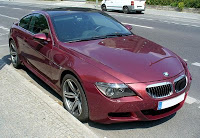Neuroscience
 When I see a car fast approaching in the rear-view mirror, I find I can't help but make assumptions about the personality of the driver based on the model of car they're driving. Now a new study suggests these kinds of stereotypes can affect our memory for how fast a car was travelling - a finding that could have important implications for the trustworthiness of eye witness statements.
When I see a car fast approaching in the rear-view mirror, I find I can't help but make assumptions about the personality of the driver based on the model of car they're driving. Now a new study suggests these kinds of stereotypes can affect our memory for how fast a car was travelling - a finding that could have important implications for the trustworthiness of eye witness statements.
In an initial experiment, Graham Davies played ten-second video clips of a BMW and a (smaller, less powerful) Volkswagen Polo to 42 undergrads and asked them to estimate how fast the cars were going. Based on past research showing that participants expect BMWs to be driven faster than Volkswagen Polos, Davies thought that the students would overestimate the speed of the BMW. In fact, he found the opposite. Participants tended to overestimate the speed of the Polo, perhaps because it was a noisier car, and smaller vehicles are generally perceived as going faster than larger cars.
A second experiment pulled out all the stops in an attempt to provoke participants to rely on their driver stereotypes. Participants were told that the BMW was driven by a young male, and the Polo by a 62-year-old; they were shown photos of the drivers; and they were asked to speculate about the drivers' personalities. But even after all this, the participants' judgements of the cars' speeds were still accurate and there was no tendency to overestimate the speed of the BMW. This was true even though participants had earlier made the kind of assumptions about the two drivers that you might expect - for example, that the BMW driver was more aggressive and reckless.
 The key finding emerged in the third experiment. This was similar to the first two, but this time participants were asked, unexpectedly, to estimate the speed of the cars a day after seeing the video clips. In this case, the BMW's speed was estimated to be significantly faster (56 mph) than the Polo's (50 mph), even though both cars were actually travelling at the same speed (60 mph). Davies was surprised that both estimates were below the cars' actual speeds, but nonetheless the retrospective judgements appeared to have been influenced by the stereotypes held by participants' about the cars and their drivers. Moreover, the real-world relevance of this finding is clear, given that it is this kind of retrospective judgement that eye witnesses are asked to make following a crime.
The key finding emerged in the third experiment. This was similar to the first two, but this time participants were asked, unexpectedly, to estimate the speed of the cars a day after seeing the video clips. In this case, the BMW's speed was estimated to be significantly faster (56 mph) than the Polo's (50 mph), even though both cars were actually travelling at the same speed (60 mph). Davies was surprised that both estimates were below the cars' actual speeds, but nonetheless the retrospective judgements appeared to have been influenced by the stereotypes held by participants' about the cars and their drivers. Moreover, the real-world relevance of this finding is clear, given that it is this kind of retrospective judgement that eye witnesses are asked to make following a crime.
_________________________________
 Davies, G. (2009). Estimating the speed of vehicles: the influence of stereotypes. Psychology, Crime & Law, 15 (4), 293-312 DOI: 10.1080/10683160802203971
Davies, G. (2009). Estimating the speed of vehicles: the influence of stereotypes. Psychology, Crime & Law, 15 (4), 293-312 DOI: 10.1080/10683160802203971
Post written by Christian Jarrett (@psych_writer) for the BPS Research Digest.
- Doubt Cast On The Maxim That Time Goes Faster As You Get Older
Time gets faster the older you are. Or does it? When William Friedman and Steve Janssen asked 49 New Zealand undergrads (average age 21) and 50 older adults (average age 68) to say how fast time passed for them, including the last week, month and year,...
- The Digest Blog Is Five Years Old Today!
It's five years to the day that the first ever post was published on the BPS Research Digest blog. Although the Research Digest began as a fortnightly email newsletter in 2003, it wasn't until February 2005 that the blog was born. The first post...
- We're Useless At Choosing Between Time-saving Options
From a host preparing for a dinner party to a country constructing a new national stadium, we all tend to underestimate how long things are going to take - an error that's been dubbed the 'planning fallacy'. According to Ola Svenson, contributing...
- Drivers Are Territorial About Their Cars
Psychologists have examined the way people see their cars as part of their territory. Graham Fraine and colleagues conducted focus groups with a cross-section of 89 participants, from young, novice drivers to more experienced people who drive vehicles...
- Keep Your Eyes Off The Road
Harming innocent bystanders when racing to answer an emergency call is every police driver’s worst nightmare. Sadly such incidents, though rare, are on the increase. David Crundall and colleagues at the University of Nottingham investigated the suggestion...
Neuroscience
Driver stereotypes affect our memory of how fast a car was travelling
In an initial experiment, Graham Davies played ten-second video clips of a BMW and a (smaller, less powerful) Volkswagen Polo to 42 undergrads and asked them to estimate how fast the cars were going. Based on past research showing that participants expect BMWs to be driven faster than Volkswagen Polos, Davies thought that the students would overestimate the speed of the BMW. In fact, he found the opposite. Participants tended to overestimate the speed of the Polo, perhaps because it was a noisier car, and smaller vehicles are generally perceived as going faster than larger cars.
A second experiment pulled out all the stops in an attempt to provoke participants to rely on their driver stereotypes. Participants were told that the BMW was driven by a young male, and the Polo by a 62-year-old; they were shown photos of the drivers; and they were asked to speculate about the drivers' personalities. But even after all this, the participants' judgements of the cars' speeds were still accurate and there was no tendency to overestimate the speed of the BMW. This was true even though participants had earlier made the kind of assumptions about the two drivers that you might expect - for example, that the BMW driver was more aggressive and reckless.
 The key finding emerged in the third experiment. This was similar to the first two, but this time participants were asked, unexpectedly, to estimate the speed of the cars a day after seeing the video clips. In this case, the BMW's speed was estimated to be significantly faster (56 mph) than the Polo's (50 mph), even though both cars were actually travelling at the same speed (60 mph). Davies was surprised that both estimates were below the cars' actual speeds, but nonetheless the retrospective judgements appeared to have been influenced by the stereotypes held by participants' about the cars and their drivers. Moreover, the real-world relevance of this finding is clear, given that it is this kind of retrospective judgement that eye witnesses are asked to make following a crime.
The key finding emerged in the third experiment. This was similar to the first two, but this time participants were asked, unexpectedly, to estimate the speed of the cars a day after seeing the video clips. In this case, the BMW's speed was estimated to be significantly faster (56 mph) than the Polo's (50 mph), even though both cars were actually travelling at the same speed (60 mph). Davies was surprised that both estimates were below the cars' actual speeds, but nonetheless the retrospective judgements appeared to have been influenced by the stereotypes held by participants' about the cars and their drivers. Moreover, the real-world relevance of this finding is clear, given that it is this kind of retrospective judgement that eye witnesses are asked to make following a crime._________________________________
 Davies, G. (2009). Estimating the speed of vehicles: the influence of stereotypes. Psychology, Crime & Law, 15 (4), 293-312 DOI: 10.1080/10683160802203971
Davies, G. (2009). Estimating the speed of vehicles: the influence of stereotypes. Psychology, Crime & Law, 15 (4), 293-312 DOI: 10.1080/10683160802203971Post written by Christian Jarrett (@psych_writer) for the BPS Research Digest.
- Doubt Cast On The Maxim That Time Goes Faster As You Get Older
Time gets faster the older you are. Or does it? When William Friedman and Steve Janssen asked 49 New Zealand undergrads (average age 21) and 50 older adults (average age 68) to say how fast time passed for them, including the last week, month and year,...
- The Digest Blog Is Five Years Old Today!
It's five years to the day that the first ever post was published on the BPS Research Digest blog. Although the Research Digest began as a fortnightly email newsletter in 2003, it wasn't until February 2005 that the blog was born. The first post...
- We're Useless At Choosing Between Time-saving Options
From a host preparing for a dinner party to a country constructing a new national stadium, we all tend to underestimate how long things are going to take - an error that's been dubbed the 'planning fallacy'. According to Ola Svenson, contributing...
- Drivers Are Territorial About Their Cars
Psychologists have examined the way people see their cars as part of their territory. Graham Fraine and colleagues conducted focus groups with a cross-section of 89 participants, from young, novice drivers to more experienced people who drive vehicles...
- Keep Your Eyes Off The Road
Harming innocent bystanders when racing to answer an emergency call is every police driver’s worst nightmare. Sadly such incidents, though rare, are on the increase. David Crundall and colleagues at the University of Nottingham investigated the suggestion...
